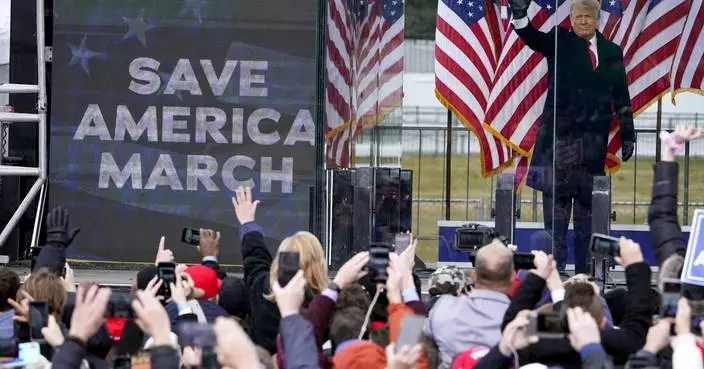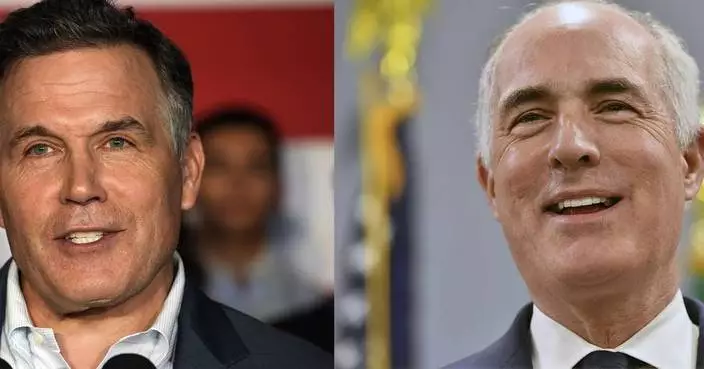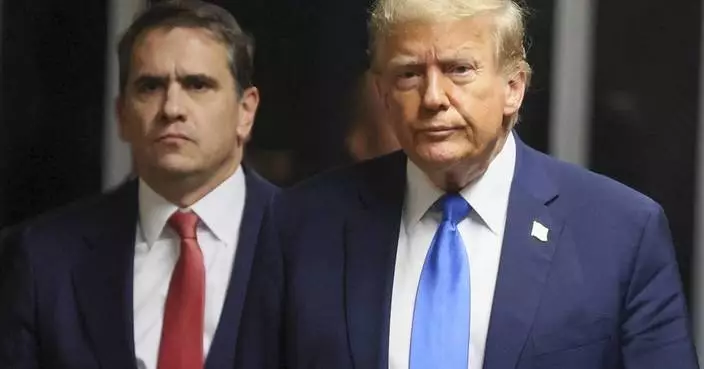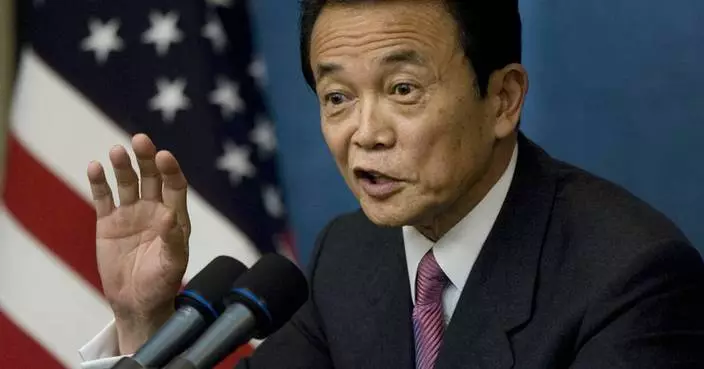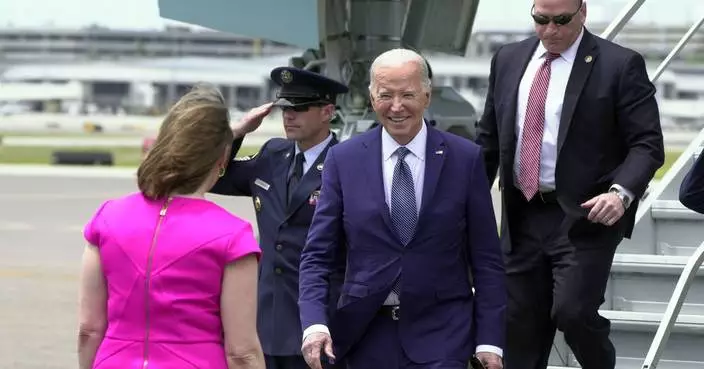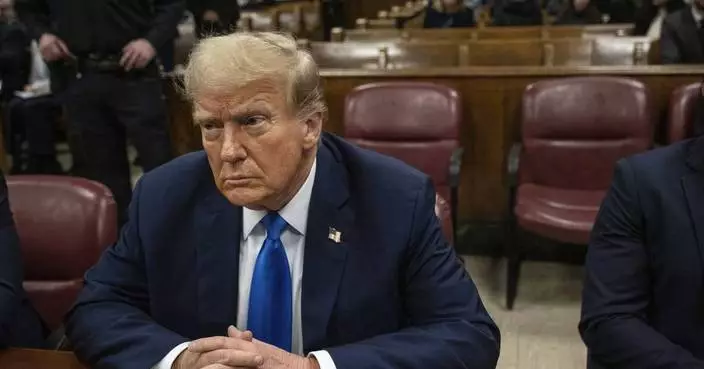When President Donald Trump’s historic impeachment trial is called to order in the Senate this week, he won’t be watching from inside the chamber or on television from the White House.
He'll be thousands of miles away at the Davos economic forum in the Swiss Alps, trying to charm global CEOs over dinner.
Trump's participation in the annual World Economic Forum will provide a conspicuous split-screen moment in a presidency familiar with them. His two-day visit to Switzerland will test his ability to balance his anger over being impeached with a desire to project leadership on the world stage.

The hotel Intercontinental is photographed in Davos, Switzerland, Monday, Jan. 20, 2020. US President Donald Trump is due to stay at the hotel for one night during his two-days visit to the World Economic Forum. The World Economic Forum will start on Tuesday. (AP PhotoMichael Probst)
Administration officials say Trump remains focused on serving the public.
“The president's work doesn't stop just because of the impeachment sham,” White House press secretary Stephanie Grisham said in an email.
Trump, who departs Washington on Monday night, said he's going to Davos to encourage businesses to invest in the U.S.
“We're now where the action is,” he said at a farmers' convention Sunday in Texas.
Swooping in for what will be his second appearance at the annual Swiss economic forum, Trump was scheduled to arrive at the ski resort early Tuesday and jet back on Wednesday to a Washington that will be consumed by the impeachment trial.
The White House did not release much advance information about the president's schedule but he is expected to give a speech and meet world leaders and business executives.
The Democratic-controlled House impeached the Republican president last month for abuse of power and obstruction of Congress after it was revealed that he had pressed Ukraine’s president to announce investigations into former Democratic Vice President Joe Biden, a Trump political rival. Trump withheld foreign aid that Congress had approved for the Eastern European nation and dangled the prospect of an Oval Office meeting as leverage.
Trump denies any wrongdoing and argues that Democrats want to remove him from office because they know they can’t deny him reelection in November. Trump would be forced to leave office if convicted, but the Republican-controlled Senate is expected to acquit him.
Trump said he would attend the Davos forum despite the awkward timing because he wants to encourage businesses to come back to the U.S.
“Our country is the hottest country anywhere in the world,” he said at the White House last week. "There's nothing even close. I’ll be meeting the biggest business leaders in the world, getting them to come here.”
The White House has not said which presidents or prime ministers will get one-on-one sessions with Trump, but he is expected to have his first meeting with the new European Commission president, Ursula von der Leyen, the first woman to hold the position.
That meeting could be the most significant, said analyst Matt Goodman, given Trump’s many disagreements with Europe over tax and trade policy, like a new digital levy by the French that will force American tech giants such as Amazon and Google to pay up.
“She's new and she's formidable,” said Goodman, who studies international economic policy as a senior vice president at the Center for Strategic and International Studies.
He predicted a difficult year ahead for U.S.-EU relations.
“It could either go very well or very badly,” Goodman said.
Trump has smarted over the French tax and his administration has announced plans to impose retaliatory tariffs of up to 100% on cheese, wine, lipstick and other French imports. France has threatened to fight back.
The U.S. has also threatened to impose retaliatory duties on $7.5 billion worth of European airplanes, cheese, wine and other goods in a separate dispute over subsidies for Airbus, a competitor to Chicago-based Boeing Co.
Trump also has sought to wring trade concessions from the EU by threatening tariffs on German autos, including BMW and Mercedes-Benz.
Trump heads to Switzerland as just the third American president, after Andrew Johnson and Bill Clinton, to face a Senate impeachment trial. Johnson and Clinton were both acquitted by the Senate.
There is precedent for international travel by an impeached U.S. leader.
During his impeachment over an affair with a White House intern, Clinton visited Japan, South Korea, Israel and the Palestinian Authority. He also traveled to Jordan for King Hussein's funeral in February 1999, just a few days before he was acquitted by the Senate.
Two days after acquittal, Clinton went to Mexico on a state visit.
Trump is planning to make his first visit to India at the end of February, probably after the conclusion of his impeachment trial. He also has talked about traveling soon to Beijing, although he has given no dates, to open a new round of trade talks with China.
Follow Darlene Superville on Twitter: http://www.twitter.com/dsupervilleap
WASHINGTON (AP) — For Senate Republican leader Mitch McConnell and House Speaker Mike Johnson, the necessity of providing Ukraine with weapons and other aid as it fends off Russia's invasion is rooted in their earliest and most formative political memories.
McConnell, 82, tells the story of his father’s letters from Eastern Europe in 1945, at the end of World War II, when the foot soldier observed that the Russians were “going to be a big problem” before the communist takeover to come. Johnson, 30 years younger, came of age as the Cold War was ending.
As both men pushed their party this week to support a $95 billion aid package that sends support to Ukraine, as well as Israel, Taiwan and humanitarian missions, they labeled themselves “Reagan Republicans” an described the fight against Russian President Vladimir Putin in terms of U.S. strength and leadership. But the all-out effort to get the legislation through Congress left both of them grappling with an entirely new Republican Party shaped by former President Donald Trump.
While McConnell, R-Ky., and Johnson, R-La., took different approaches to handling Trump, the presumptive White House nominee in 2024, the struggle highlighted the fundamental battle within the GOP: Will conservatives continue their march toward Trump’s “America First” doctrine on foreign affairs or will they find the value in standing with America's allies? And is the GOP still the party of Ronald Reagan?
“I think we’re having an internal debate about that,” McConnell said in an interview with The Associated Press. “I’m a Reagan guy and I think today — at least on this episode — we turned the tables on the isolationists.”
Still, he acknowledged, “that doesn’t mean they’re going to go away forever.”
McConnell, in the twilight of his 18-year tenure as Republican leader, lauded a momentary victory Tuesday as a healthy showing of 31 Republicans voted for the foreign aid; that was nine more than had supported it in February. He said that was a trend in the right direction.
McConnell, who has been in the Senate since 1985, said passing the legislation was “one of the most important things I’ve ever dealt with where I had an impact."
But it wasn’t without cost.
He said last month he would step away from his job as leader next year after internal clashes over the money for Ukraine and the direction of the party.
For Johnson, just six months into his job as speaker, the political crosscurrents are even more difficult. He is clinging to his leadership post as right-wing Republicans threaten to oust him for putting the aid to Ukraine to a vote. While McConnell has embraced American leadership abroad his entire career, Johnson only recently gave complete support to the package.
Johnson has been careful not to portray passage as a triumph when a majority of his own House Republicans opposed the bill. He skipped a celebratory news conference afterward, describing it as “not a perfect piece of legislation” in brief remarks.
But he also borrowed terms popularized by Reagan, saying aggression from Russia, China and Iran “threatens the free world and it demands American leadership.”
“If we turn our backs right now, the consequences could be devastating,” he said.
Hard-line conservatives, including some who are threatening a snap vote on his leadership, are irate, saying the aid was vastly out of line with what Republican voters want. They condemned both Johnson and McConnell for supporting it.
“House Republican leadership sold out Americans and passed a bill that sends $95 billion to other countries,” said Republican Sen. Tommy Tuberville of Alabama, who opposed the bill. He said the legislation "undermines America's interests abroad and paves our nation's path to bankruptcy.”
Johnson has been lauded by much of Washington for doing what he called “the right thing" at a perilous moment for himself and the world.
“He is fundamentally an honorable person,” said Senate Majority Leader Chuck Schumer, D-N.Y., who brokered the negotiations and spent hours on the phone and in meetings with Johnson, McConnell and the White House.
Sen. Mitt Romney, R-Utah, said Johnson and McConnell “both showed great resolve and backbone and true leadership at a time it was desperately needed.”
When McConnell began negotiations over President Joe Biden's initial aid request last year, he quickly set the terms for a deal. He and Schumer agreed to pair any aid for Ukraine with help for Israel, Schumer said, and McConnell demanded policy changes at the U.S. border with Mexico.
On McConnell's mind, he said, was that Trump was “unenthusiastic” about providing more aid to Kyiv. Yet McConnell, whose office displays a portrait of every Republican president since Reagan with the exception of Trump, had a virtually nonexistent relationship with the man he often refers to not by name, but simply as “the former president.”
Still, Trump would prove to hold powerful sway. When a deal on border security neared completion after months of work, Trump eviscerated the proposal as insufficient and a “gift” to Biden's reelection. Conservatives, including Johnson, rejected it out of hand.
With the border deal dead, McConnell pushed ahead with Schumer on the foreign aid, with the border policies stripped out, solidifying their unusual alliance. The Senate leaders met weekly throughout the negotiation.
“We disagreed on a whole lot, but we really stuck together,” Schumer said.
“We just persisted. We could not give up on this."
Meanwhile, a small group of GOP senators began working on an idea they thought could give Johnson some political wiggle room. Sens. Lindsey Graham of South Carolina, Kevin Cramer of North Dakota and Markwayne Mullin of Oklahoma took an idea that Trump had raised — structuring the aid to Ukraine as a loan — and tried to make it reality.
Through a series of phone calls with Trump, several House members, as well as the speaker, they worked to structure roughly $9 billion in economic aid for Ukraine as forgivable loans — just as it was in the final package.
“Our approach this time was to make sure that the politics were set, meaning that President Trump is on board,” Mullin said.
The conversations culminated in Johnson making a quick jaunt to Florida, where he stood side by side with Trump at his Florida club just days before moving ahead with the Ukraine legislation in the House.
It was all enough, with Democratic help, to get the bill across the finish line. The legislation, which Biden signed into law on Wednesday, included some revisions from the Senate bill, including the loan structure and a provision to seize frozen Russian central bank assets to rebuild Ukraine. Nine GOP senators who had opposed the first version of the bill swung to “yes” largely because of the changes Johnson had made.
The result was a strong showing for the foreign aid in the Senate, even though the decision could prove costly for Johnson.
What comes next on Ukraine is anyone's guess.
While the $61 billion for Ukraine in the package is expected to help the country withstand Moscow's offensive this year, more assistance will surely be needed. Republicans, exhausted after a grueling fight, largely shrugged off questions about the future.
“This one wasn’t easy,” Mullin said.
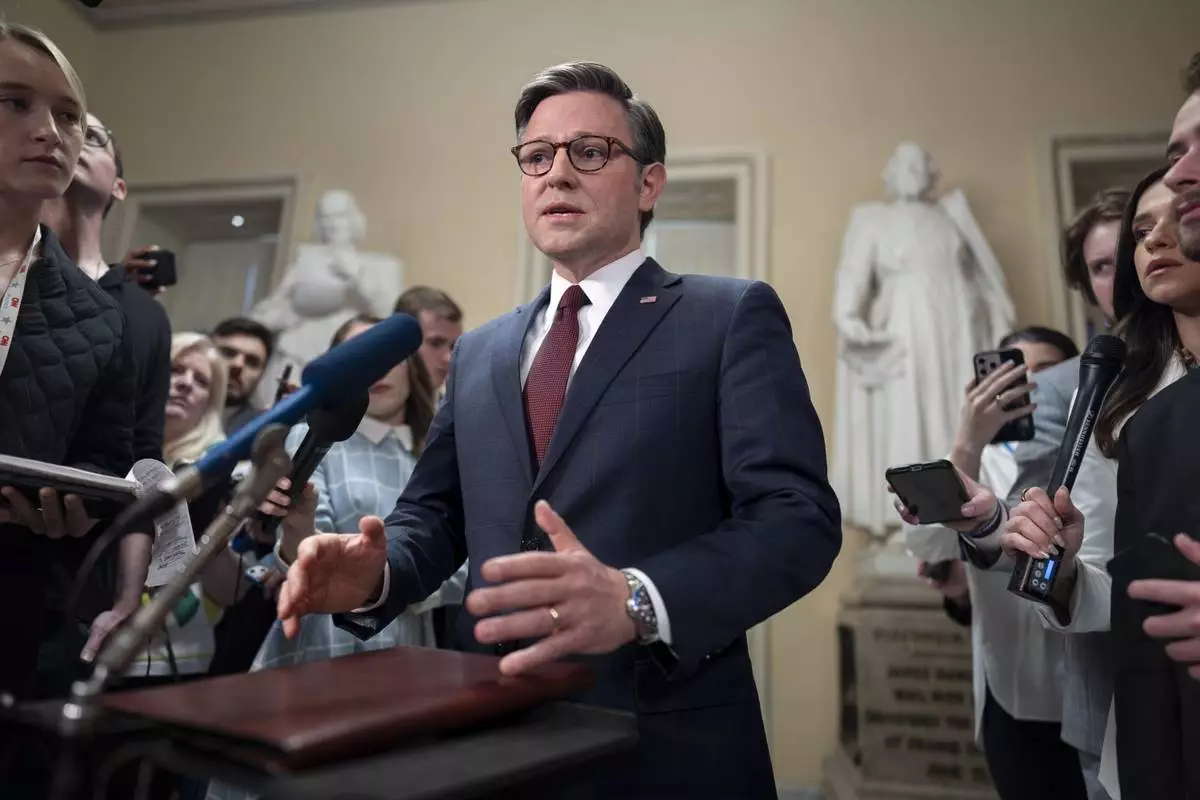
Speaker of the House Mike Johnson, R-La., talks to reporters just after the House voted to approve $95 billion in foreign aid for Ukraine, Israel and other U.S. allies, at the Capitol in Washington, Saturday, April 20, 2024. (AP Photo/J. Scott Applewhite)
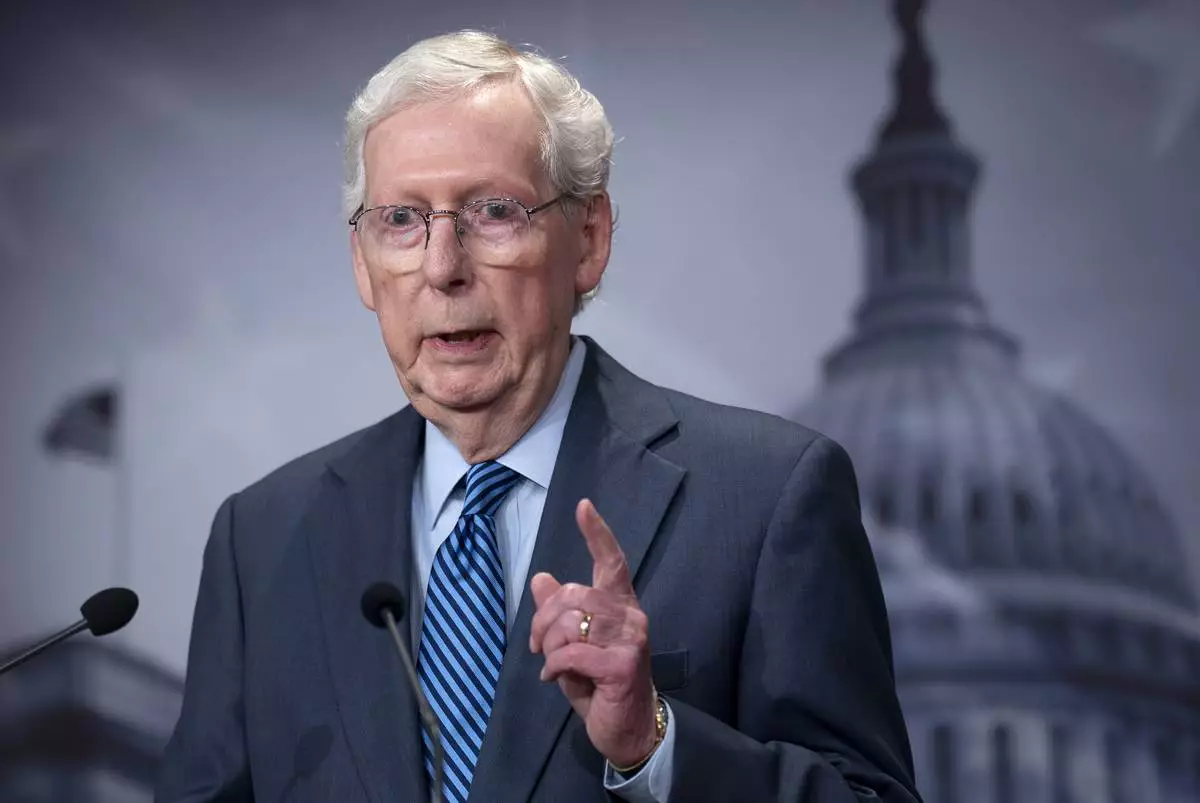
Senate Minority Leader Mitch McConnell, R-Ky., praises support for Ukraine as the Senate is on track to pass $95 billion in war aid to Ukraine, Israel and Taiwan, at the Capitol in Washington, Tuesday, April 23, 2024. (AP Photo/J. Scott Applewhite)
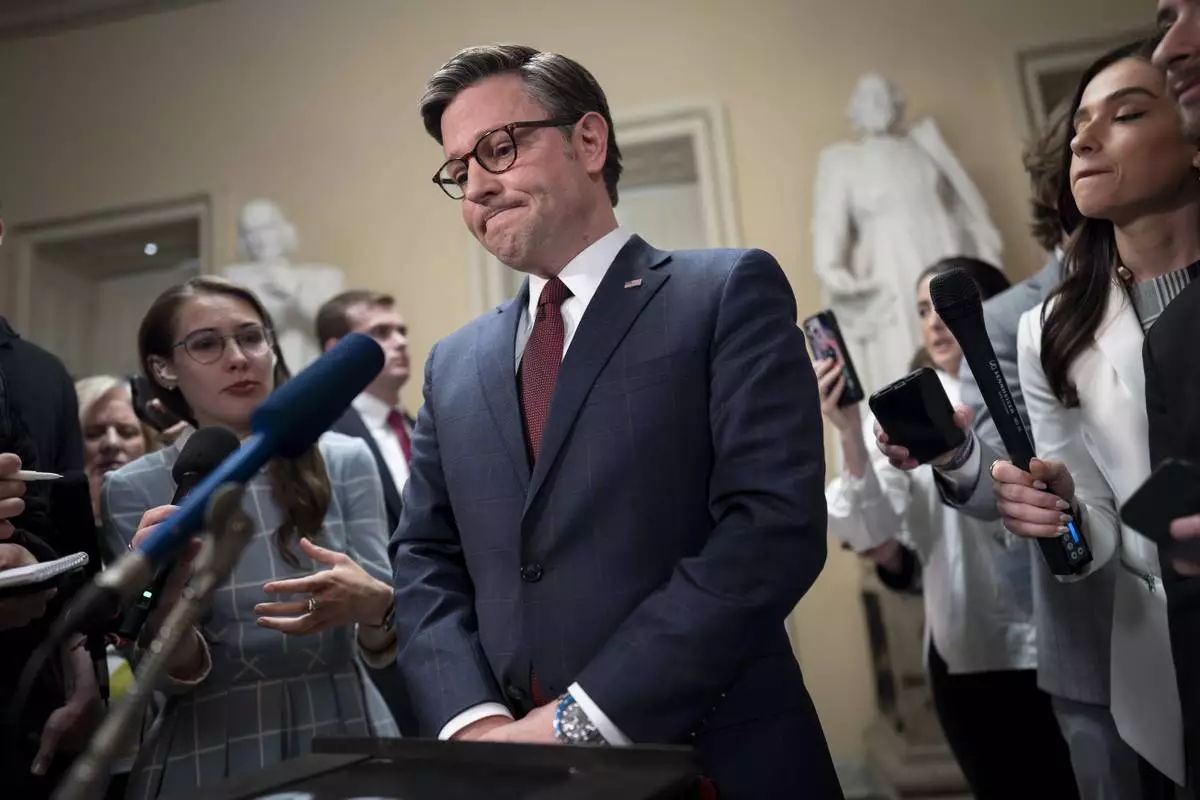
Speaker of the House Mike Johnson, R-La., talks to reporters just after the House voted to approve $95 billion in foreign aid for Ukraine, Israel and other U.S. allies, at the Capitol in Washington, Saturday, April 20, 2024. (AP Photo/J. Scott Applewhite)
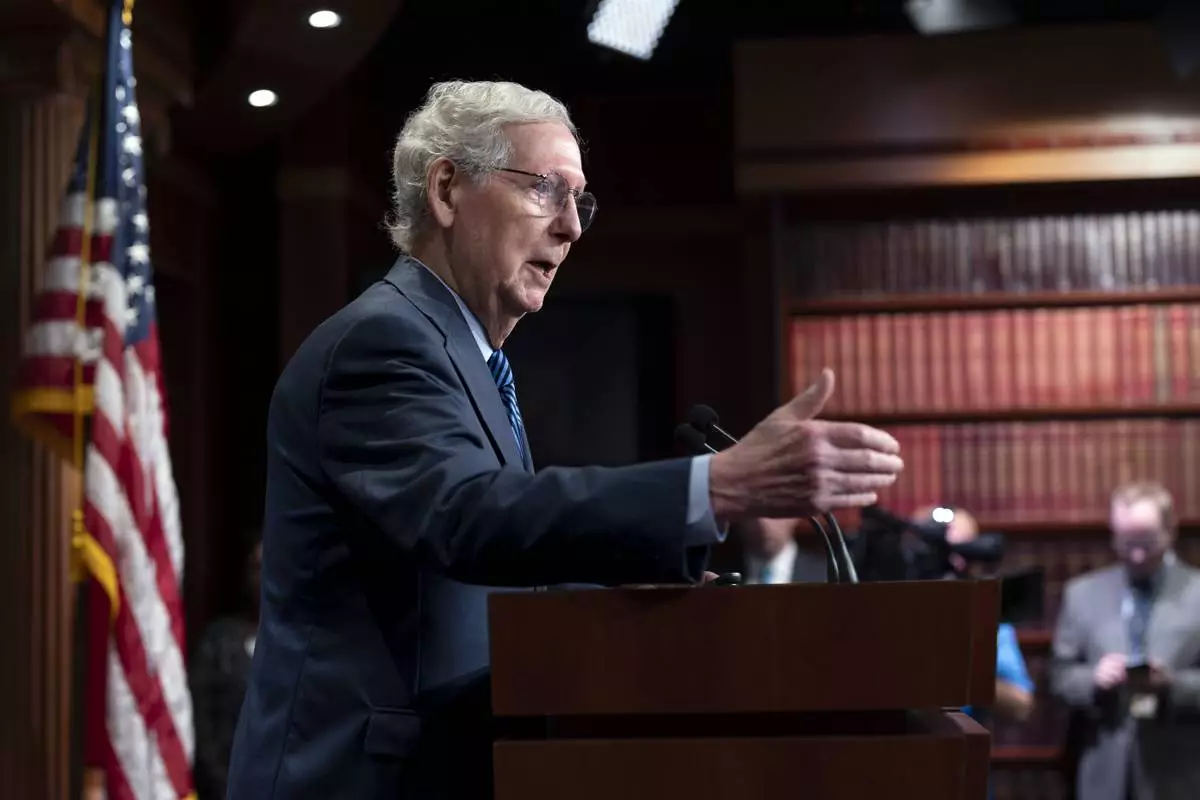
Senate Minority Leader Mitch McConnell, R-Ky., praises support for Ukraine as the Senate is on track to pass $95 billion in war aid to Ukraine, Israel and Taiwan, at the Capitol in Washington, Tuesday, April 23, 2024. (AP Photo/J. Scott Applewhite)
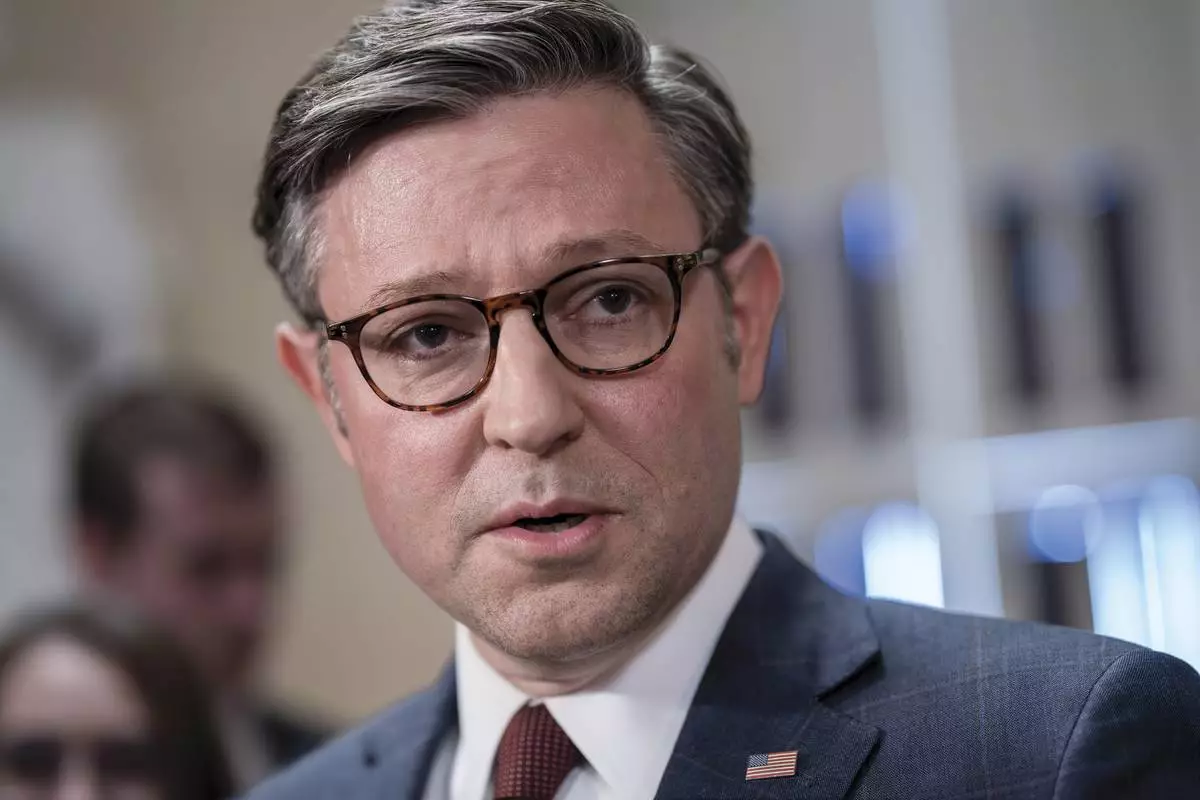
Speaker of the House Mike Johnson, R-La., talks to reporters just after the House voted to approve $95 billion in foreign aid for Ukraine, Israel and other U.S. allies, at the Capitol in Washington, Saturday, April 20, 2024. (AP Photo/J. Scott Applewhite)
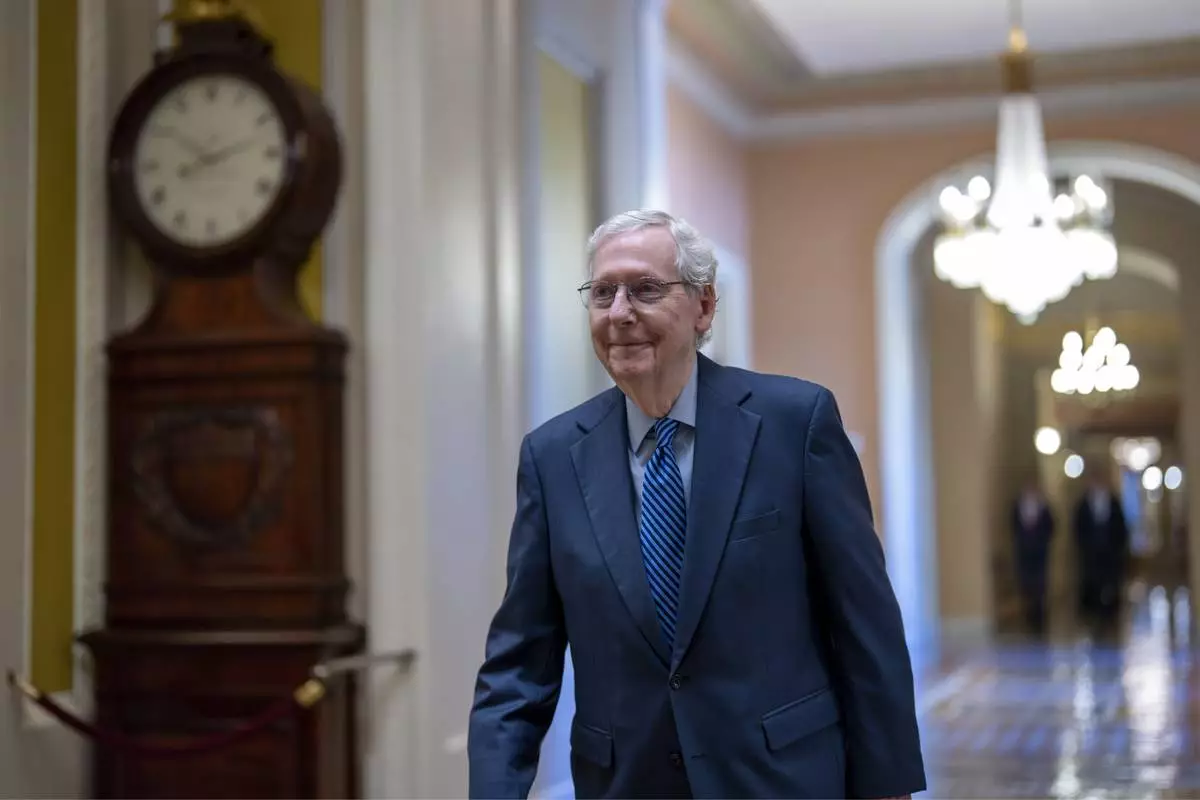
Senate Minority Leader Mitch McConnell, R-Ky., walks to the chamber as the Senate prepares to advance the $95 billion aid package for Ukraine, Israel and Taiwan passed by the House, at the Capitol in Washington, Tuesday, April 23, 2024. (AP Photo/J. Scott Applewhite)










